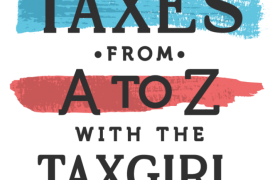It’s my annual “Taxes from A to Z” series! If you’re wondering whether you can claim home office expenses or whether to deduct a capital loss, you won’t want to miss a single letter.
B is for Bonus
A bonus is typically money or equivalent that you get in addition to your usual compensation. But because we call it something different, taxpayers assume that it is treated differently. That’s not necessarily the case. Here’s what you need to know.
If you receive a bonus or award from your employer – no matter how it’s paid out (cash, car, or Bitcoin) – you must report it as income in the year that it’s received unless it’s specifically excluded (like some stock options). If, however, your employer promises to pay you a bonus in the future, you don’t have to report it until it’s made available to you, even if it’s in writing or otherwise spelled out. That includes a fixed promise to pay you a certain amount over time.
If you’re an employee, that income will most likely show up with the rest of your compensation in box 1. That’s because it’s taxed the same. There’s no surtax on bonuses for most folks, despite what you’ve heard around the water cooler. A bonus could push you into a higher tax bracket but remember that we have a progressive income tax so the higher tax rate would only apply to the amount over the bracket threshold (for a quick refresher on progressive rates, click here).
Here’s where it gets complicated. When you are paid, whether it’s regular pay or a bonus, your employer is required to withhold federal income tax. That’s no surprise. But the Internal Revenue Service (IRS) may consider your bonus as “supplemental wages” for purposes of withholding. If that happens, the amount of withholding may be at a higher rate than your regular income tax bracket.
The rules that apply to supplemental wages can be complicated but are basically broken into two parts:
- Taxpayers who receive more than $1 million in supplemental wages during the tax year; and
- The rest of us.
Since I suspect there are more of “the rest of us” than folks with million-dollar bonuses, I’ll tackle that first.
- If your bonus is paid together with your regular wages – for example, a single check without any clear division noted – your withholding happens just like it would with any other check. It’s treated as though it’s regular payroll.
- If your bonus is paid separately from your regular wages or if it’s paid together but noted separately – for example, a single check with the division specified – your employer has a little flexibility. The employer can either withhold a flat 22% (the easiest option) on your bonus or figure the withholding amount using a more complicated formula based on your regular and combined withholding amounts. The latter, more complicated option tends to result in a higher withholding amount for most taxpayers.
If you receive more than $1 million in supplemental wages during the year, the amount that exceeds $1 million is subject to withholding at 37% (or the highest rate of income tax for the year). The amount under the $1 million is subject to the same rules as the rest of us, as above. It doesn’t matter what’s on your form W-4. For the amounts under $1 million, the regular supplemental wages apply.
Keep in mind that these rules apply to federal income tax. No matter which withholding rules may apply, the regular payroll tax rules (for Social Security and Medicare) still apply.
If all of this is causing you to hyperventilate a little, don’t. Remember: Even though the withholding on your bonus may vary or be complicated, your bonus will largely be treated at tax time as though it was regular compensation (some limited exceptions apply). So, whether your employer withholds 22% or 28% on your bonus, if your tax rate is 25%, you’ll pay 25% come tax time. If your employer withheld too much, you’ll get the difference back in the form of a tax refund. If your employer withheld too little, you’ll have to pay the difference.
It’s important that your employer gets it right – and important that you check your withholding to make sure that it makes sense – but there’s no need to freak out. If you’re nervous that you’re not on the right track, you can always check your withholding using the IRS withholding calculator and make an adjustment on your form W-4 during the year, if necessary.
For your taxes from A to Z, here’s the rest of the series:




